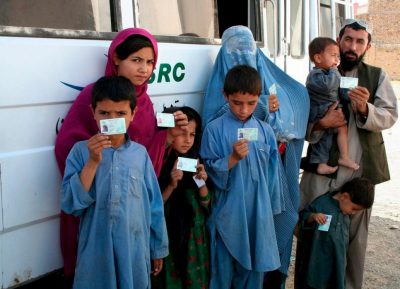By Ali Mohsin

Last week, the Pakistani government callously doubled down on its strategy of using Afghan refugees as pawns in its ongoing political dispute with Afghanistan when it refused to grant a long-term extension of their stay in Pakistan. Islamabad’s move will anger Kabul, which has struggled to absorb and reintegrate the massive influx of Afghans returning from Pakistan in recent years.
On December 31, the Proof of Registration (PoR) cards of 1.4 million Afghan refugees in Pakistan expired after the federal government refused to provide an extension on time. The PoR cards allow the refugees to live in Pakistan “legally” and avoid harassment by the state. On January 3, the long-suffering refugees learned they would only be given a 30-day extension, rather than the 1-year extension the government had been considering under a trilateral agreement with Afghanistan and the U.N. High Commissioner for Refugees (UNHCR). The decision to limit the extension to 30 days was made during a meeting of the federal Cabinet in Islamabad which was chaired by Pakistan Prime Minister Shahid Khaqan Abbasi.
There are currently 1.4 million registered Afghan refugees in Pakistan, with hundreds of thousands of undocumented refugees also living in the country. The first wave of refugees began came over from Afghanistan during the Soviet-Afghan War, with many more arriving during the bloody civil war of the 1990s. In 2001, the US invaded Afghanistan, beginning the longest war in American history. The 16-year neo-colonial occupation has devastated the lives of the Afghan people and created a new generation of refugees.
Many of the refugees have lived in Pakistan for decades and have had children in the country. There are indeed children among the 1.4 million registered Afghan refugees. A large number of refugees have established firm roots in the country and have lost all ties to Afghanistan. Kabul has struggled mightily to reintegrate the refugees into Afghan society, repeatedly insisting that Afghanistan does not have the resources to deal with massive numbers of returnees from across the border. Many refugees are also terrified at the prospect of returning to war-torn Afghanistan. Civilian casualties due to the war reached a 16-year high during the first six months of 2017, according to the UN.
Pakistani politicians often scapegoat the refugees as “terrorists” and charge them with being a burden on the state. Indeed, while Islamabad has agreed not to forcibly return refugees to Afghanistan, in recent years, it has resorted to a policy of intimidation and harassment of the refugees, so as to bring about their “voluntary” repatriation to the country. In mid-2016, Pakistan launched what Gerry Simpson, a refugee expert at Human Rights Watch, described at the time as the “world’s largest recent anti-refugee crackdown.” Afghan refugees have told human rights organizations about the cruel methods used by Pakistani authorities to coerce them into leaving for Afghanistan, including deportation during the winter and police abuses like arbitrary detention, extortion and nocturnal police raids. In fact, during the recent three day period during which 1.4 million refugees lost their documented status, the refugees were reportedly harassed by security personnel, leading them to confine themselves in their homes until the 30-day extension was granted.
In seeking to build domestic support for the forced repatriation of refugees to Afghanistan, Pakistani officials have described the refugee camps where the Afghans live as “safe havens” for terrorists. There is no doubt, however, that Islamabad hopes to use the refugee crisis to punish Afghanistan for shifting ever closer towards it arch-rival, New Delhi.
The deepening alliance between Afghanistan and India is viewed by Pakistan’s ruling elites as a vital security threat due to their fear of “strategic encirclement” by India, but Washington has turned a blind eye to Islamabad’s concerns and has encouraged the two countries to further enhance bilateral relations. Moreover, US President Donald Trump has recently adopted a hardline stance towards Islamabad, with Washington suspending military aid to Pakistan on January 4. The increasingly belligerent approach of the US towards Pakistan, where anti-US sentiment remains high, has forced the country’s ruling establishment to adopt a defiant stance towards Washington. Pakistan’s working-class majority remains steadfastly opposed to America’s imperialist war in Afghanistan, and to their government’s role in supporting and facilitating the ongoing occupation. With few options available to hit back at the US and Afghanistan, there is a danger that the Pakistani government may decide to throw the Afghan refugees to the wolves.
*
Ali Mohsin is an independent writer. He has a Master’s degree in Political Science and a special interest in issues affecting workers in the US, Pakistan and globally. He can be reached at alimohsin1917@gmail.com
Featured image is from UNHCR.
The original source of this article is Global Research
Copyright © Ali Mohsin, Global Research, 2018













